《短语动词和动词短语》
英语中常见的动词短语和短语动词的区别和用法
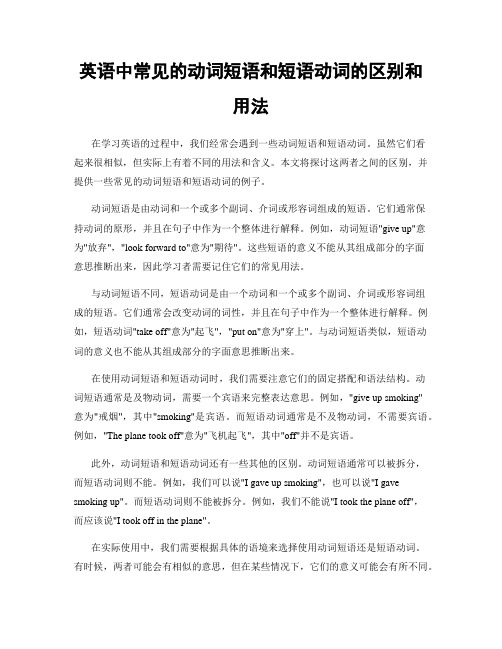
英语中常见的动词短语和短语动词的区别和用法在学习英语的过程中,我们经常会遇到一些动词短语和短语动词。
虽然它们看起来很相似,但实际上有着不同的用法和含义。
本文将探讨这两者之间的区别,并提供一些常见的动词短语和短语动词的例子。
动词短语是由动词和一个或多个副词、介词或形容词组成的短语。
它们通常保持动词的原形,并且在句子中作为一个整体进行解释。
例如,动词短语"give up"意为"放弃","look forward to"意为"期待"。
这些短语的意义不能从其组成部分的字面意思推断出来,因此学习者需要记住它们的常见用法。
与动词短语不同,短语动词是由一个动词和一个或多个副词、介词或形容词组成的短语。
它们通常会改变动词的词性,并且在句子中作为一个整体进行解释。
例如,短语动词"take off"意为"起飞","put on"意为"穿上"。
与动词短语类似,短语动词的意义也不能从其组成部分的字面意思推断出来。
在使用动词短语和短语动词时,我们需要注意它们的固定搭配和语法结构。
动词短语通常是及物动词,需要一个宾语来完整表达意思。
例如,"give up smoking"意为"戒烟",其中"smoking"是宾语。
而短语动词通常是不及物动词,不需要宾语。
例如,"The plane took off"意为"飞机起飞",其中"off"并不是宾语。
此外,动词短语和短语动词还有一些其他的区别。
动词短语通常可以被拆分,而短语动词则不能。
例如,我们可以说"I gave up smoking",也可以说"I gave smoking up"。
动词和动词短语(最详细)

三、常见动词(短语)用法辨析
单词 spend pay cost
主语
搭配
含义
人 人
物 it
sb. spend+时间、金钱 +(in)doing/on sth.
某人花费……(做)某 事 某人花费金钱在……上 某物花费某人……(金 钱) 某人花费……做某事
sb. pay+金钱 for sth.
sth. cost(+人)+金钱 it takes(+人)+时间、 to do sth.
双写该辅音字母, 再加-ed
live- lived, lived carry-carried, carried
stop- stopped, stopped
② 不规则动词的变化。(见九年级英语下册不规则动词表)
3、动词的现在分词的构成:
动词特征 一般动词 变 化 例 词
直接加-ing
looklooking watchwatching
表示“带走、拿走”,指从说话处带到别处。
表示“搬、带走、携带”,不表示动作的方向,强调随身 携带。 表示“去拿来”,指动作往返的过程。
carry fetch
单词
borrow
含义
搭配
间为“借入”,为终止性动 borrow sth. from sb. 词。表示主语“借入”某物。 间为“借出”,为终止性动 lend sth. to sb. 词。表示主语“借出”某物。 间为“保存,借”,为持续 性动词。表示“长时间地借”
我正在找我的笔。(现在进行时) I’m looking for my pen. 这些杯子是中国制造的。(被动语态) These cups are made in China.
动词和动词短语

动词和动词短语一、系动词1.表示人或事物特征和状态的系动词,如smell,live,look,sound,feel,seem,appear等。
例如:The actor looked his part.那个演员看上去和他演的角色很相称。
He appears fl normal person.他看来是一个正常人。
2.表示状态的变化,如go,grow,run,turn,become,wash,get,turn OUt,come等。
例如:His dream has come true.他的梦想成真了。
The river went dry.河流干涸了。
3.表示某种状态的持续或延续,如last,stand,lie,keep,stay,continue,hold等。
例如:He stayed young.他依然年轻。
He told me to keep calm under all circumstances.他告诉我在任何情况下都要保持镇静。
注意:常用系动词及与之搭配的形容词:①feel:sorry,lonely,proud,shy。
happy等。
②get:late,fat,dark,worse,angry,well等。
③go:hungry,bad,lame,broken,mad,blind等。
④grow:worse,calm,cold,old,thin,big,fat,dark 等。
⑤keep:calm,fine,quiet,warm,happy等。
⑥look:strong,tired,fit,nervous,friendly,pretty,excellent等。
⑦remain:single,unmarried,calm,open,active,silent 等。
⑧prove:false,correct,easy,difficult,useful等。
⑨turn:yellow,grey,pale,red,black,green,cold等。
英语中动词短语与短语动词的区别
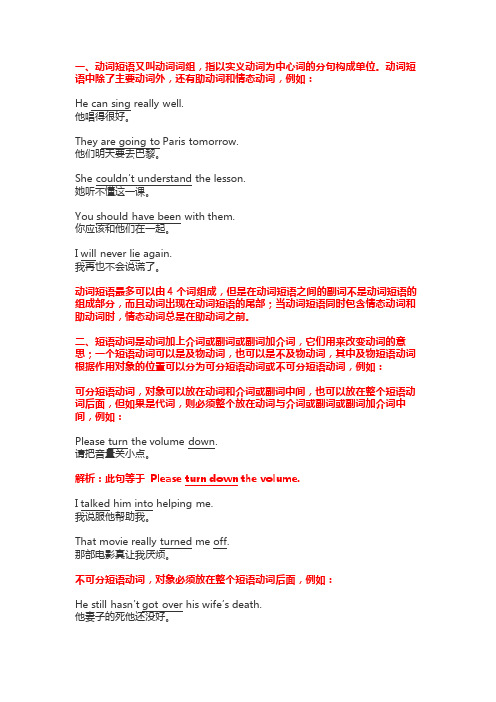
一、动词短语又叫动词词组,指以实义动词为中心词的分句构成单位。
动词短语中除了主要动词外,还有助动词和情态动词,例如:He can sing really well.他唱得很好。
They are going to Paris tomorrow.他们明天要去巴黎。
She couldn’t understand the lesson.她听不懂这一课。
You should have been with them.你应该和他们在一起。
I will never lie again.我再也不会说谎了。
动词短语最多可以由4个词组成,但是在动词短语之间的副词不是动词短语的组成部分,而且动词出现在动词短语的尾部;当动词短语同时包含情态动词和助动词时,情态动词总是在助动词之前。
二、短语动词是动词加上介词或副词或副词加介词,它们用来改变动词的意思;一个短语动词可以是及物动词,也可以是不及物动词,其中及物短语动词根据作用对象的位置可以分为可分短语动词或不可分短语动词,例如:可分短语动词,对象可以放在动词和介词或副词中间,也可以放在整个短语动词后面,但如果是代词,则必须整个放在动词与介词或副词或副词加介词中间,例如:Please turn the volume down.请把音量关小点。
解析:此句等于Please turn down the volume.I talked him into helping me.我说服他帮助我。
That movie really turned me off.那部电影真让我厌烦。
不可分短语动词,对象必须放在整个短语动词后面,例如:He still hasn’t got over his wife’s death.他妻子的死他还没好。
I don’t think she takes after her mother.我认为她不喜欢她母亲。
No one tried to break up the fight.没有人试图阻止这场战斗。
常见的动词短语及例句
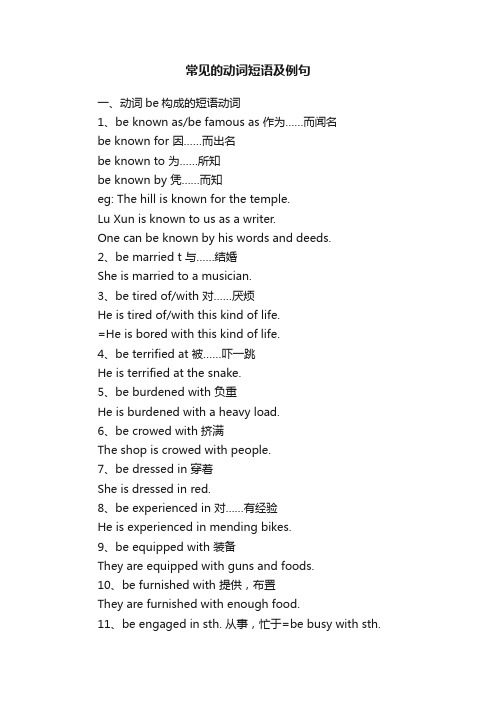
常见的动词短语及例句一、动词be构成的短语动词1、be known as/be famous as 作为……而闻名be known for 因……而出名be known to 为……所知be known by 凭……而知eg: The hill is known for the temple.Lu Xun is known to us as a writer.One can be known by his words and deeds.2、be married t 与……结婚She is married to a musician.3、be tired of/with 对……厌烦He is tired of/with this kind of life.=He is bored with this kind of life.4、be terrified at 被……吓一跳He is terrified at the snake.5、be burdened with 负重He is burdened with a heavy load.6、be crowed with 挤满The shop is crowed with people.7、be dressed in 穿着She is dressed in red.8、be experienced in 对……有经验He is experienced in mending bikes.9、be equipped with 装备They are equipped with guns and foods.10、be furnished with 提供,布置They are furnished with enough food.11、be engaged in sth. 从事,忙于=be busy with sth.He has been engaged in writing novels.12、be engaged to 与……订婚My daughter is engaged to a nice doctor.13、be about to do sth. 正要做……I was just about to go swimming when our guide saw me and stop me.14、be fit to do/be fit for 胜任,适合于He is fit to do this work.15、be worth doing 值得做……The film is worth seeing again16、be proud of 以……为骄傲I am proud of being a Chinese.17、be used to sth./ doing sth. 习惯于……My grandpa is not used to living in the noisy city.18、be content with 对……感到满意You should be content with what you are.19、be content to do sth./with 甘愿于……,满足于……I am content with your work this time.20、be up to 应由……,轮到……It is up to her to answer the question.21、be meant/intended for 打算给,打算用作Is this valuable painting meant for me?22、be connected with 与……有联系He was also connected with the government.23、be crazy about 对……狂热Many young people are crazy about music.二、动词break构成的短语1、break out 爆发The Anti-Japanese War broke out in 19372、break in 打断,闯入Two robbers broke in and robbed the bank of a lot of money.3、break into 闯入,破门而入They broke into the bedroom and found the man lying on the floor.4、break away from 脱离Lincoln said it was not fight for the south to break away from the union.5、break down (机器、车辆)坏了;失败了;摧毁;分解We are sorry to arrive late, but the car broke down.6、break through 突破The marchers broke through the line of the police.7、break off 折断;中断;断绝Let us break off for half an hour and have some tea.8、break up 驱散;拆散The police broke up the crowd.三、动词carry构成的短语动词1、carry on 进行He had learned enough English to carry on a conversation.2、carry out 执行;进行They were carrying out an important experiment.3、carry away 拿走Please carry these desks away.4、carry off 夺走;拿走Some unknown man carried off the prize.四、动词call构成的短语动词1、call on 拜访某人;号召We will call on Mr. Li tomorrow.We are called on to help those in trouble.2、call at 拜访某地I called at your office yesterday, but you were not in.3、call for 需要;要求;邀约人;取某物Success called for hard work.call for a doctor 去请医生4、call in 请来;收回Mother is badly ill, so call in a doctor at once.5、call up 打电话;征召;回想起I called T om up and told him the news.In most countries men are called up at the age of 18.As I grew up in a small town at the foot of a mountain, the visit to the village called up scenes of my childhood.五、动词catch, hold 构成的短语动词1、catch/take/get hold of sth. 抓住某物Catch/Get/T ake hold of the rope, and I will pull you up.2、catch up with 赶上Work hard and I am sure you are able to catch up with others in class.3、catch fire 着火;烧着Last night a big building caught fire.4、catch sight of 发现;看到When the mice caught sight of the cat, the mice run away as quickly as possible.5、hold up 举起;阻滞(交通);耽搁He held up one of his fingers and showed it to the class.In the rush hour the traffic is hold up.6、hold back 阻止;控制We must hold them back from fighting.7、hold out 坚持;拿出We must hold out until helps comes.六、动词come构成的动词短语1、come into……进入……come into being (事物、局面)产生;形成The custom came into being long long ago.2、come along 过来;快点Come along! It is nearly 8.3、come out 出来;出版How did the printing come out?4、come true 实现I am sure your dream will come true one day.5、come back to life 苏醒过来When the wounded soldier came back to life, he found himself in hospital.6、come to the point 说到要点;触及问题实质7、come about 发生;造成The event came about as he had predicted it.8、come across 偶然碰见;遇见=run acrossY ou are the most beautiful woman I have ever come across.9、come to an end 结束Y ou duties here have come to an end.10、come to light 为人所知;显露The robbery did not come to light until the next day.11、come up with 提出;想出He came up with a new suggestion.七、动词do构成的短语动词1、do well in 在某方面做得好My cousin is a sailor and he is doing very well in the navy.2、do good to 对……有好处Doing morning exercises will do good to your health.3、do harm to 对……有坏处T oo much noise does harm to our health.4、do with 处理What did you do with our goods?5、do sb. a favour 帮某人的忙Will you de me a favour to carry it upstairs?6、do up 系纽扣;梳理Look, your bottom is not done up.八、动词get构成的动词短语1、get in touch with 同……取得联系2、get up 起床He gets up very early everyday.3、get back 回来;取回I will get back next weekend.4、get on 上车Y ou should not get on the bus until it has stopped completely.5、get over 克服;度过Y ou will soon get over these difficulties.6、get off 下车The bus stopped and the passengers got off.7、get together 相聚We should go to a restaurant to get together.8、get on/along well with 与……相处融洽I am getting on well with my classmates.9、get into 进入;陷入Do not get into the habit of smoking.10、get into trouble 陷入麻烦11、get in a word 插话12、get rid of 除掉We are doing our best to get rid of pollution.13、get through 通过;接通;完成;经历I tried to phone you but I could not get through.14、get to 到达He had to get to the other side of street to attend a meeting.15、get about/around/round 传开;传出去The news of the disaster soon get about.16、get across 使理解The teacher tried to explain the problem, but the explanation did not get across to the class.17、get away 离开I was in a meeting and could not get away.18、get down to (doing) sth. 安心做;开始认真于Y ou must get down to your studies this year.九、动词give构成的短语1、give up 放弃I persuaded him to give up the foolish plan.2、give in 屈服;投降He would not give in to the enemy.3、give out 用完;耗尽Our food and water will give out soon.4、get out of 从……出来;摆脱He got out of debt.5、give away 分发;泄露;捐赠He gave away most of his fortune to the poor work.6、give off 放出This engine gives off lots of smoke and steam.7、give back 归还;恢复Living here has given me back my health.十、动词go构成的短语动词1、go ahead 继续;干吧He went ahead with the work and got it done.2、go by (时间)过去;经过(地点)Do not let the good chance go by.3、go out (灯、火)熄灭When they arrived, the fire had gone out.4、go on (doing) sth. 继续做某事Please go on with your work.5、go on to do sth. 接着做另外的事He went on to watch TV after he had finished his homework.6、go over 检查;复习When I came into the classroom, our teacher isgoing over our homework.7、go through 完成;通过;经过,仔细检查During the night the computers go through the information.8、go all about 竭尽全力They went all out to build the dam.9、go about 开始着手;到处走动;传开How does one go about getting the information? 10、go against 违背They are going against our wishes.11、go back 回家;追溯This festival goes back to Roman times.12、go for 运用于;应用于The medicine went for nothing.13、go in 参加;爱好She went in for a singing competition.14、go with 相配I want some shoes to go with these trousers.15、go without 不吃;不喝;不用The poor boy often has to go without supper. 16、go beyond 超过That is going beyond a joke.17、go up 上升;上涨The goods have gone up in quality.18、go down 下降;下沉;降落The moon has gone down.十一、动词have构成的短语动词1、have a word with sb. 和某人有句话说Could you spare a few minutes? I want to have a word with you.2、have words with 争吵They have had words with her about money.3、have (deep) effect on 对……有(深远)影响The book has great effects on his life.4、have difficulty in/find difficulty in/have trouble in 做……有困难We have difficulty in writing the composition.十二、动词knock构成的短语动词1、knock at 敲门;敲窗Y ou should knock at the door before coming in. 2、knock down 撞倒They make sure the cows not knock the youngtrees down or eat the leaves.3、knock off 撞掉下来A child ran into the street and knocked thewoman off her bicycle.4、knock about 连续打击/碰撞;漂泊;闲逛He has knocked about all over Asia.十三、动词keep构成的动词短语1、keep on doing sth. 继续或反复做某事T om kept on doing studying English and using it when he lived in London.2、keep up 坚持Keep up your courage and your will succeed.3、keep up with 跟上She can’t keep up with others.4、keep back 保留;阻止;隐瞒;拒绝She was in deep sorrow, but she kept back her tears.5、keep away from 远离Keep children away from fire.6、keep out of 使……不进入In the ancient time, the Great Wall was built inorder to keep enemy out of country.7、keep one’s word 遵守诺言I am sure your will keep your word.8、keep in touch with 与……保持联系We kept in touch with each other by writing letters.9、keep silent 保持沉默He kept silent about the matter.10、keep/prevent/stop……from doing sth.制止(防止)做某事The heavy rain kept us from going out.11、keep off 使……远离Please keep off the grass.十四、动词look构成的动词短语1、look up抬头;查阅Y ou may look up new word in a dictionary.2、look out 小心Look out! The pan is on fire.3、look into 调查We will further look into the matter.4、look forward to 盼望We look forward to knowing the results of the exam.5、look through 仔细看;浏览Y ou have to look through the papers before you hand them.6、look up to 尊敬Y oung children look up to old people.7、look down upon 瞧不起The days are gone when women were looked down upon.8、look like看起来Y ou look like your father.9、look on……as (=treat/consider/take/think of……as)把……看作He looks on the computer as his friend.10、look after 照顾When I was ill, my mother looked after me.11、look for寻找What are you looking for?十五、动词make构成的短语动词1、make a dive for 向……猛冲The dog made a dive for the bone.2、make an apology to 向……道歉He made an apology to her.3、be made up of 组成Two thirds of the earth’s surface is made up of vast ocean.4、made up 组成;化妆;打扮;补充;弥补;编造Great Britain and Northern Ireland make up the United Kingdom.The whole story is made up.5、make room for 给……腾地方Would you like to make room for the old lady?6、make up one’s mind 下决心I have made up my mind to work harder thanbefore.7、make up for 弥补We must make up for the time wasted before.8、make use of 利用We should make full use of the books in the library.9、make one’s way 排除困难前进After the film ended we made our way out ofcinema.10、make progress 进步With the teacher’s help, I have made muchprogress.11、make repairs 修理They are making repairs in that building.12、make a living 谋生He began to make a living by himself when he wasten.13、make for 走向;前往They set off by car and made the nearest town. 14、make the best of 尽量使用Mother didn’t enjoy his j ob, but she made the bestof it.15、make out 认出;理解We made out a figure in the darkness.16、make it 成功After hard-working, we made it at last.17、make a promise 许诺言Father made a promise to buy me a new computer.十六、动词put构成的短语动词1、put away 放好;收起来Put the books away after reading.2、put down 记下;平息Put down the gentleman’s address.3、put out 扑灭;出版It took the fire-fighters four hours to put out the fire.4、put up 举起;建造;张贴;公布;投宿Many new buildings have been put up in our city.5、put up with 忍受He is prepared to put up with it for the time being.6、put on 穿上;上演;增加We will put on the new play next month.7、put off 延期;拖延The sports meet will be put off because of the bad weather.8、put through 完成;(打电话)把……接通Can you put me through to this number?9、put forward 提出建议;拨快(钟等)The doctor put forward a good suggestion.十七、动词take构成的短语动词1、take up 占据(时间,空间);从事The piano takes up too much space in the room.2、take……out 拿出去。
高考英语词法系列:动词和动词短语
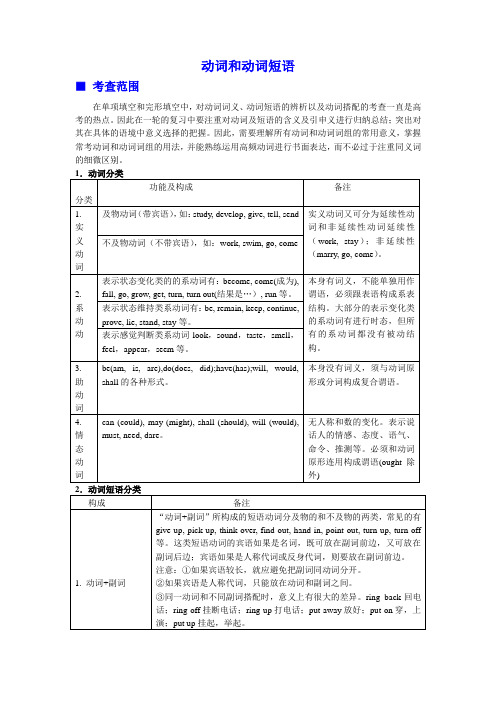
动词和动词短语■考查范围在单项填空和完形填空中,对动词词义、动词短语的辨析以及动词搭配的考查一直是高考的热点。
因此在一轮的复习中要注重对动词及短语的含义及引申义进行归纳总结;突出对其在具体的语境中意义选择的把握。
因此,需要理解所有动词和动词词组的常用意义,掌握常考动词和动词词组的用法,并能熟练运用高频动词进行书面表达,而不必过于注重同义词的细微区别。
■高频考点高考对动词的考查重点集中在实义动词的常见意义和用法,而对助动词的考查较少。
对动词短语的考查重点是第1~3项,而考查第4~6项的情况较少。
高考试题分析■真题探究1.(2010安徽)No matter how low you consider yourself, there is always someone ______you wishing they were that highA. getting rid ofB. getting along withC. Looking up toD. looking down upon【答案与解析】C getting rid of意为“摆脱;去除”;getting along with意为“与……相处;进展”;Looking up to意为“尊敬;敬仰”;looking down upon意为“看不起;轻视”。
句意为“你无论认为自己怎样低下, 总希望有个高尚的人来尊敬你。
”2. (2010全国Ⅰ)The workers ______ the glasses and marked on each box “ This Side Up”A. carriedB. deliveredC. pressedD. packed【答案与解析】D 句意:工人们把玻璃制品包装好并且每个盒子上标记上“此面向上”。
选项为四个意思上毫无关联的动词, 此题考查动词的词义辨析。
carry 译为搬运, deliver译为递送, press译为按, 压, pack译为打包。
动词短语和短语动词的区别
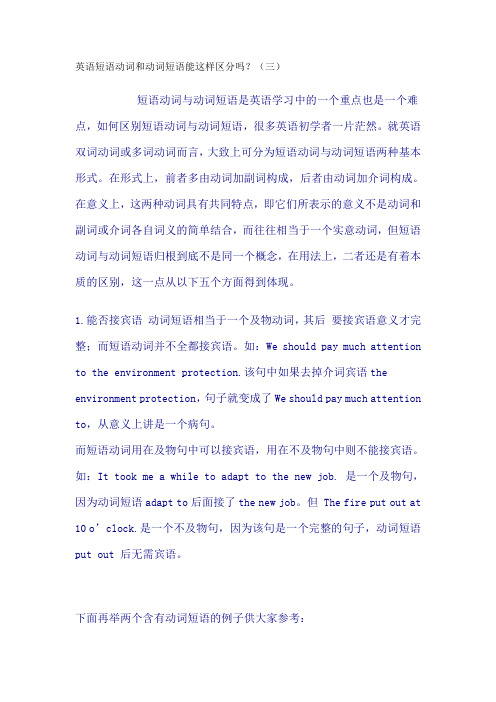
英语短语动词和动词短语能这样区分吗?(三)短语动词与动词短语是英语学习中的一个重点也是一个难点,如何区别短语动词与动词短语,很多英语初学者一片茫然。
就英语双词动词或多词动词而言,大致上可分为短语动词与动词短语两种基本形式。
在形式上,前者多由动词加副词构成,后者由动词加介词构成。
在意义上,这两种动词具有共同特点,即它们所表示的意义不是动词和副词或介词各自词义的简单结合,而往往相当于一个实意动词,但短语动词与动词短语归根到底不是同一个概念,在用法上,二者还是有着本质的区别,这一点从以下五个方面得到体现。
1.能否接宾语动词短语相当于一个及物动词,其后要接宾语意义才完整;而短语动词并不全都接宾语。
如:We should pay much attention to the environment protection.该句中如果去掉介词宾语the environment protection,句子就变成了We should pay much attention to,从意义上讲是一个病句。
而短语动词用在及物句中可以接宾语,用在不及物句中则不能接宾语。
如:It took me a while to adapt to the new job. 是一个及物句,因为动词短语adapt to后面接了the new job。
但 The fire put out at 10 o’clock.是一个不及物句,因为该句是一个完整的句子,动词短语put out 后无需宾语。
下面再举两个含有动词短语的例子供大家参考:(1) I waited for him all day.(2) What does this sigh stand for?典例分析 When he realized the police had spotted him, the man _______ the exit as quickly as possible.A) made off B) made for C) made out D) made up答案B。
动词与动词短语

第四讲动词和动词短语考点一动词的分类1,及物动词:可直接加宾语。
如:do, hate, like, marry, say, tell.2,不及物动词:加适当的介词后再加宾语。
如:come, go, arrive3,助动词:have (has, had),do (did, does)4,可接双宾语的动词如: show, buy, sell, offer, make, teach, award等,其用法为:1,动词+间宾(人)+直宾(物)buy me a book.2,动词+直宾+for(为)+间宾buy a book for me.3,动词+直宾+to(方向)+间宾show the book to me.5, 系动词:be (am, is, are, was, were)除be动词外,还有些动词可以用作连系动词,它们不能单独作谓语,必须与表语(多为形容词)一起构成合成谓语。
【对点演练】一. 单句语法填空,根据汉语提示完成句子。
1.You know how I ____(讨厌)math.2.He _________(进入)the room and shut the door.3.Do you ____(助动词)something to eat?4.He is saving up to buy a house ____(介词) his family.5.He ___(系动词) staying with friends this weekend.答案:1 hate 2came into 3have 4for 5is二. 单句语法改错1.Now I like to the film some.2.Will you go us? Sure!3.Love me as I love you?4.Do not expect him to show kindness for you.5.I will brain you if you don't keep quietly.答案:1去掉to 2 go后面加with 3Love前面加Do,且Love改love 4for改to 5quietly改quiet考点二动词辨析1. 重点掌握某些近义词的辨析如:admit, allow, permit; contain, include; receive, accept; want, wish, hope, expect; stay, remain, keep; discover, uncover等。
- 1、下载文档前请自行甄别文档内容的完整性,平台不提供额外的编辑、内容补充、找答案等附加服务。
- 2、"仅部分预览"的文档,不可在线预览部分如存在完整性等问题,可反馈申请退款(可完整预览的文档不适用该条件!)。
- 3、如文档侵犯您的权益,请联系客服反馈,我们会尽快为您处理(人工客服工作时间:9:00-18:30)。
短语动词和动词短语
一。
动词短语
动词短语的搭配可分为下列六种基本类型。
1.动词+副词
1)作及物动词,例:
He brought up his children strictly.
从以上的例句中可以看出,在“动词+副词”的词组中宾语位置有两种情况:宾语如是名词,
则可置于副词后面,亦可置于动词和副词之间。
而如果宾语是代词,只能置于动词后面,即
动词和副词之间。
2)作不及物动词,例:
Something unexpected has turned up.
出现了令人意外的情况。
(turn up=appear)
3)既可作及物动词又可作不及物动词,例:
The barrel of gunpowder blew up.(不及物)火药桶爆炸了。
The soldiers blew up the bridge.(及物)士兵们把桥炸毁了。
2.动词+介词
动词与介词构成的词组在词义上相当于一个及物动词,宾语总是在介词后面,例:
I don’t much care for television.我不很喜欢电视。
(care for=like)
3.动词+副词+介词
在这类动词短语中,动词、副词、介词紧密结合,是动副词组和动介词组的合成体,词义上
相当于一个及物动词。
它兼有以上两类短语动词的特点,但宾语总是位于介词之后,例:
We must work hard to make up for lost time.我们必须努力工作来弥补失去的时间。
(make up for=
compensate)
4.动词+名词
这类动词短语中的常见动词是have,take,give,make等,后面的名词通常是从动词转化
而来的动作名词,并表达了短语动词的真正意义,例:
Let’s have another try.让我们再试一下。
(have a try=v.try)
5.动词+名词+介词
这类动词短语只用作及物动词。
名词前可加形容词说明程度,宾语总是位于介词之后,例:
Keep an eye on the baby while I am out.我不在家时请照看一下小孩子。
6.be+形容词(包括过去分词作形容词)+介词
这类动词短语也相当于及物动词,宾语位于介词后面,形容词是短语动词的真正词义,例:
I know he is slow at understanding,but you have to be patient with him.我知道他理解力差,但你得对他耐心些。
二、短语动词
(1)短语动词常常是两个词(一个动词+一个副词性小品)构成,如:wake up , get up ,turn out 等。
(2)同一个动词后面可以有不同的副词性小品词,构成不同意义的短语动词。
如:He turn on the radio .Bob turned out smiling.。
